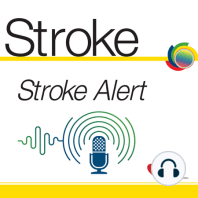31 min listen
Stroke Alert June 2021
FromStroke Alert
ratings:
Length:
25 minutes
Released:
Jun 17, 2021
Format:
Podcast episode
Description
Stroke Alert June 2021 On Episode 5 of the Stroke Alert Podcast, host Dr. Negar Asdaghi highlights two articles from the June 2021 issue of Stroke: "Preexisting Mild Cognitive Impairment, Dementia, and Receipt of Treatments for Acute Ischemic Stroke” and “Body Mass Index in 1.9 Million Adolescents and Stroke in Young Adulthood.” She also interviews Dr. Shyam Prabhakaran, from the University of Chicago, about his article "Predictors of Early Infarct Recurrence in Patients With Symptomatic Intracranial Atherosclerotic Disease." Dr. Negar Asdaghi: 1) Do people with mild cognitive impairment receive the same quality of stroke care as their cognitively normal counterparts? 2) Is there a causative relationship between the alarming rise in adolescent obesity and the rise in the incidence of stroke under the age of 50? 3) What are the independent predictors of radiographic recurrence in patients with symptomatic intracranial atherosclerotic disease? These are the topics that we will cover in today's podcast. You're listening to the Stroke Alert Podcast. Stay with us. Dr. Negar Asdaghi: From the Editorial Board of Stroke, welcome to the Stroke Alert Podcast. My name is Negar Asdaghi. I'm an Associate Professor of Neurology at the University of Miami Miller School of Medicine and your host for the monthly Stroke Alert Podcast. For the June 2021 issue of Stroke, we have a range of publications that cover a variety of topics from activation of neuroinflammatory pathways and intracerebral hemorrhage to predictors of outcome in patients with mild and rapidly improving ischemic stroke, which I encourage you to review, in addition to our podcast. Later in today's podcast, I have the privilege of interviewing Dr. Shyam Prabhakaran from University of Chicago on his work with various radiographic biomarkers as predictors of outcome in patients with symptomatic intercranial atherosclerotic disease. But first, with these two papers. Dr. Negar Asdaghi: In the United States, one in five adults over the age of 65 have mild cognitive impairment, and one in seven have a formal diagnosis of dementia. With our aging population, these numbers are estimated to triple by year 2050. Prior studies suggest that patients with dementia are less likely to receive evidence-based stroke care as compared to those with normal cognition. Less is known about the quality of stroke care amongst patients with mild cognitive impairment. In their paper titled "Preexisting Mild Cognitive Impairment, Dementia, and Receipt of Treatments for Acute Ischemic Stroke," Dr. Deborah Levine from Departments of Neurology and Internal Medicine at the University of Michigan and colleagues studied the quality of care in acute ischemic stroke patients with mild cognitive impairment, or MCI, and preexisting dementia as compared to patients with normal cognition. Dr. Negar Asdaghi: This was a cross-sectional analysis of prospectively obtained data on adults with acute ischemic stroke included in the Brain Attack Surveillance in the Corpus Christi project from 2008 to 2013. Primary outcome of the study is a composite quality measure of defect-free care calculated by dividing the number of treatments that a patient received by the number of treatments they were eligible to receive. Defect-free care was defined as receipt of seven stroke performance measures when eligible, and included administration of IV tPA, use of antithrombotic therapy by end of hospital day two, administration of DVT prophylaxis, assessment for rehabilitation, discharge on antithrombotic therapy, discharge on lipid-lowering therapy, and discharge on anticoagulation therapy for atrial fibrillation. Dr. Negar Asdaghi: Amongst 836 adults included in this study with a median age of 65, 58%, that's over half of the patients in this study, had some degree of cognitive impairment prior to their presenting stroke. 44% of patients with pree
Released:
Jun 17, 2021
Format:
Podcast episode
Titles in the series (39)
Stroke Alert September 2021: Monthly summary & analysis of selected research published in the Stroke journal by Stroke Alert
